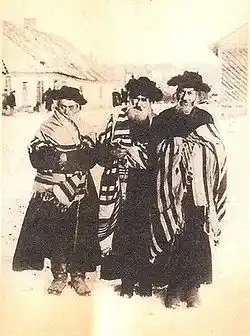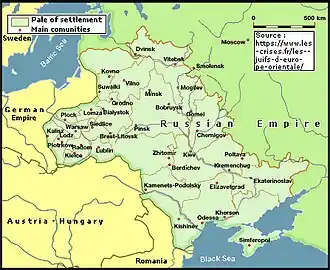
Ukrainian Jewish surnames are the family names of Jewish people who lived in Ukraine. From the ninth century onward, Jews began settling in the area between the western city of Uzhgorod and the eastern city of Lugansk, now known as Ukraine. This region is also the birthplace of the Hasidic movement, which emerged in the 18th century as a spiritual revival movement emphasizing mysticism over formal and scholarly approaches to Jewish practice. Rabbi Israel Ben Eliezer, also known as the Baal Shem Tov, who founded Hasidism, was born and died in Ukraine. The Chabad-Lubavitch movement's Menachem Mendel Schneerson, known as "The Rebbe," was born in the Black Sea port of Mykolaiv, Ukraine, on April 5, 1902. In the 19th century, Jews played a significant role in the development of commerce and industry, particularly in Kyiv, Odessa, and Kharkiv, making Ukraine a densely populated area of Jews. Additionally, Ukraine fostered a thriving Jewish culture, where Klezmer music, traditional Eastern European Jewish folk music, originated and many Yiddish writers and poets were born. At its peak, Ukraine had over a million Jews who spoke nearly 100% Yiddish as their native language, according to American Jewish historian Lance Sussman. Sholem Aleichem, the renowned author of "Fiddler on the Roof," was born in the shtetl of Pereiaslav, south of Kyiv, and the musical's setting likely mirrors the shtetl life in which its writer grew up.
The majority of the Jewish population of the Russian Empire lived in Ukraine, but in matters of documentation, they were subject to Russian authorities. Therefore, detailed information on the formation of Jewish surnames in the Russian Empire can be found in the article Russian Jewish Surnames. However, the Ukrainian language and geography also played an important role in the formation of Jewish surnames.
PatronymicsPatronymics

Among Jews who lived among Slavic peoples (Poles, Belarusians, Ukrainians), patronymic surnames were often formed using the suffix "-ovich/-evich":
Some of them are derived from diminutive forms (Berkovich - from Berko (Ber), Itskovich - from Itsko (Itzhak), Gershkovich, etc.). Less commonly used was the suffix "-ov/-ev":
Patronymic surnames with Slavic formants "-ovich/-evich" and "-ov/-ev" among Jews were usually formed from typical names for Jewish culture, which appeared in the Old Testament, formed on the basis of Yiddish and ancient Hebrew language.
MatronymicsMatronymics
In some areas of Ukraine and Belarus, an original group of matronymic surnames was in use. These surnames were formed from feminine nicknames, which were themselves formed from male names using the suffix "-ikha":
- Senderikhin (from the nickname "Senderikha," meaning "wife of Sender")
- Lemelikhis (from the nickname "Lemelikha," meaning "wife of Lemel")
- Peysikhis (from the nickname "Peysikha," meaning "wife of Peysakh"), etc.
Derived from nicknamesDerived from nicknames
Surnames based on the characteristics of a person were common in Uman and surrounding towns in the beginning or middle of the 19th century among Jews. Many Jews received surnames such as:
Derived from geographic placesDerived from geographic places

Toponymic surnames, derived from geographic names, are more common among Jews, especially Ashkenazi Jews, than among other peoples.[1] According to A. S. Pribluda[2], toponymic surnames make up over 20% (1463 out of 6898) of the total number of surnames recorded by him for Jews in the USSR. The reason for this is that a toponymic surname (usually derived from a nickname) was usually given to a person who was an immigrant from another city or area. Accordingly, the surname (or nickname) indicated where this person came from. Sometimes, less frequently, such a surname (or nickname) was given to a person who traveled frequently to another city for trade or other business.
Derived from professionDerived from profession

One more common practice was to derive surnames from the profession of the bearer. In Ukraine and Belarus, for instance, the Slavic population referred to Jewish cattle slaughterers as "reznik" and the surnames Reznik, Reznikov, Reznichenko, etc. were derived from this term. Occasionally, Reznik and its derivatives can also be found among Ukrainians, meaning "butcher."
Some surnames have a Jewish origin, such as Shultsinger, which comes from "shul" meaning synagogue and "singer" meaning singer. Other Jewish surnames like Singer and Spivak (from Ukrainian "singer") also have the same connotation, referring to a cantor in the synagogue.
Talesnik, on the other hand, refers to the maker of special prayer shawls called "talits" (in Ashkenazi pronunciation, the shawl is called "tales").
In the Russian Empire, it was not uncommon for neighbors to have different surnames that were derived from the same profession. For example, Hayat (Ha'it), Schneider, Schneyder, Portnoy, Kravetz, Kroytor, Schneiderov, and Portnov are all surnames derived from the term "tailor," but in different languages. The word "hayat" means "tailor" in Hebrew, "schneider" in Yiddish and German, "kravetz" in Belarusian, Ukrainian, and Polish, while "kroytor" is the Romanian translation.
The Ukrainian suffix "-enko" was also used to create surnames, such as Kushnirenko from the Ukrainian term "kushnir" meaning "leatherworker." Similarly, Kramarov comes from the Ukrainian word "kramar" meaning "shopkeeper," while Brovarnyk is derived from the Ukrainian word for "brewer," "brovar."
Celebreties with Ukrainian Jewish surnamesCelebreties with Ukrainian Jewish surnames
See alsoSee also
Explore more on Ukrainian Jewish surnamesExplore more on Ukrainian Jewish surnames
- Last names on MyHeritage
- Historical records from Israel on MyHeritage
- How to Research Your Jewish Ancestors on MyHeritage, article by Daniella Levy on the MyHeritage Knowledge Base
- Jewish Surnames Adopted in Various Regions of the Russian Empire at Avotaynu Online
- Alexander Bayder. A Dictionary of Jewish Surnames from the Russian Empire: Revised Edition. at Avotaynu
ReferencesReferences
- ↑ Jewish Surnames at Wikipedia.ru https://shorturl.at/gjlE4
- ↑ Приблуда А. С.. Фамилии евреев СССР // Имя твоё: сборник. — Иерусалим, 1993.
- ↑ https://www.lyczkowski.net/ru/proiskhozhdenie-familii/evrejskie-familii.html?fbclid=IwAR2tU129BH2WYZk-CjAfwKWzD1qxdIBy-wW0pp-hfgqMkvzd2yrEaOYzShU#tab-feature-center4

